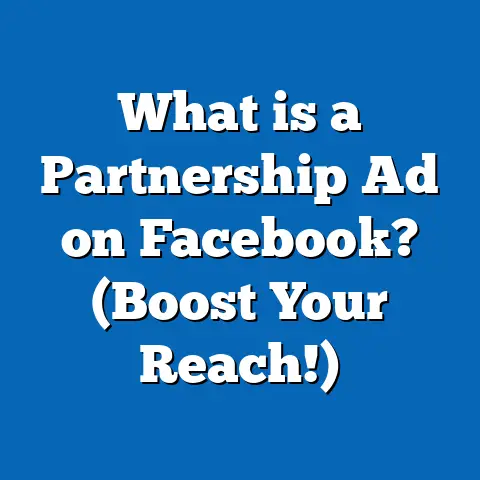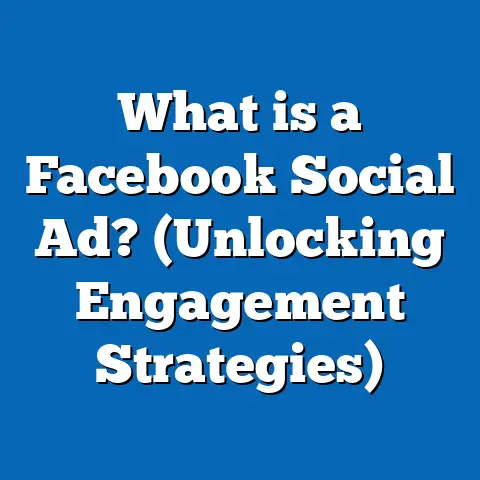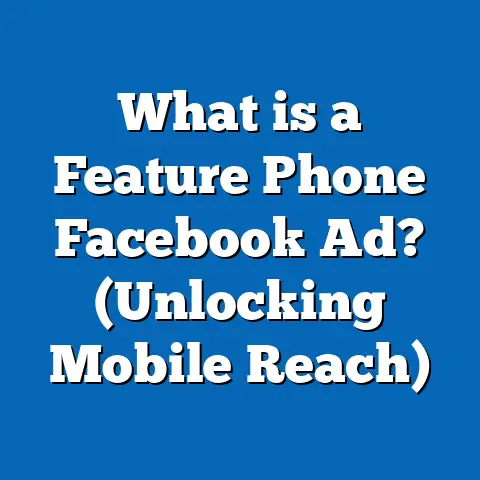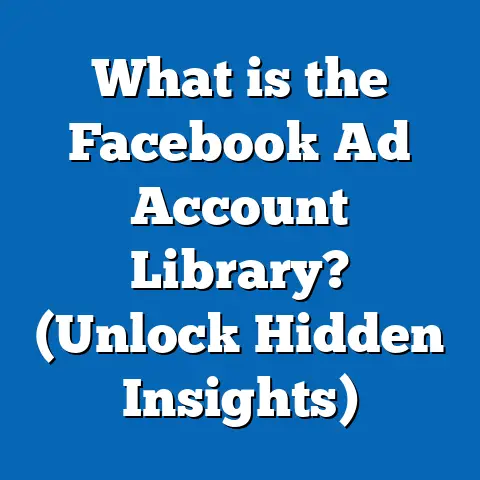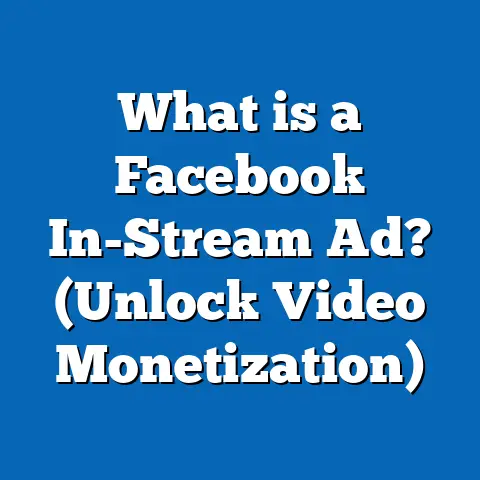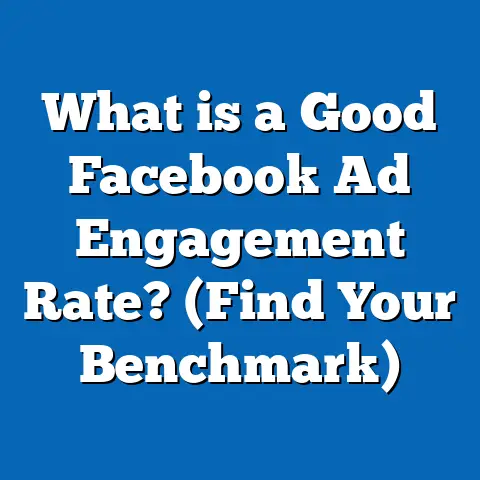What is a Facebook Ad Specialist? (Unlocking Advertising Success)
Introduction: The Power of Advertising Through the Eyes of a Child
Imagine a child watching their favorite cartoon on a tablet.
Suddenly, a colorful ad pops up showing a new toy — bright, fun, and just right for their age.
The child’s eyes light up.
They ask their parents about the toy or eagerly want to buy it.
This simple moment illustrates the essence of effective advertising: grabbing attention, creating desire, and driving action.
In the digital age, platforms like Facebook have revolutionized how businesses connect with their audiences.
With billions of users worldwide, Facebook ads offer unparalleled reach and precision targeting.
But behind every successful campaign stands a professional who knows how to harness this power — the Facebook Ad Specialist.
Understanding what a Facebook Ad Specialist does is critical for marketing professionals and business owners.
This knowledge helps you leverage Facebook advertising effectively, avoid costly mistakes, and maximize your return on investment.
What is a Facebook Ad Specialist?
A Facebook Ad Specialist is a marketing expert focused exclusively on leveraging Facebook’s advertising platform to meet business objectives.
They possess deep expertise in creating, managing, and optimizing campaigns that drive measurable results such as traffic, leads, sales, and brand awareness.
Defining the Role
Facebook Ad Specialists:
- Design targeted ad campaigns aligned with business goals.
- Utilize Facebook’s Ads Manager and Business Suite tools.
- Conduct audience research and segmentation.
- Develop compelling ad creative including copy and visuals.
- Implement tracking and pixel integration.
- Monitor KPIs and optimize campaigns for performance.
- Apply A/B testing to refine messaging and creatives.
- Manage budgets to achieve optimal cost-effectiveness.
Why Specialization Matters
Facebook’s advertising ecosystem is vast and complex.
It includes multiple ad formats, targeting options, bidding strategies, analytics, and integration possibilities with Instagram and Messenger.
Specialists stay updated with frequent changes in policies, algorithms, and features.
Without specialized knowledge, campaigns often underperform or waste budget.
Specialists ensure that every dollar spent moves closer to business growth.
The Current Landscape of Facebook Advertising
Massive User Base
As of early 2024:
- 2.96 billion people use Facebook monthly worldwide.
- Over 2 billion engage daily across Facebook, Instagram, Messenger, and WhatsApp.
- Average user spends 30 minutes per day on Facebook alone.
This massive audience offers businesses an unprecedented opportunity to reach diverse demographics globally.
Active Advertiser Community
- Over 10 million active advertisers on Facebook.
- Small businesses constitute the largest share, but enterprises also invest heavily.
- Daily ad impressions number in the billions.
Market Spend & Growth
- Global digital ad spend on Meta platforms reached over $150 billion in 2023.
- Mobile accounts for approximately 94% of ad placements.
- Video ads see 35% higher engagement rates than static images.
Effectiveness Metrics
According to WordStream analysis:
- Average Click-Through Rate (CTR) across industries: 0.9%
- Average Cost Per Click (CPC): $0.97
- Average Conversion Rate: 9.21%
- Return on Ad Spend (ROAS) varies widely but top performers achieve 6x or more.
Core Responsibilities of a Facebook Ad Specialist
Campaign Strategy Development
Specialists begin by defining clear business objectives:
- Increase brand awareness
- Drive website traffic
- Generate leads
- Boost product sales
- Promote app installs
- Encourage event attendance
They then select appropriate campaign types and objectives in Facebook Ads Manager.
Audience Research and Targeting
Effective targeting is critical for efficiency:
- Analyze customer data to build Custom Audiences (website visitors, email lists)
- Create Lookalike Audiences to find similar users
- Use detailed demographic filters (age, gender, location)
- Apply interest-based targeting (pages liked, hobbies)
- Behavioral targeting based on online activities
- Retargeting users who engaged with content but didn’t convert
Ad Creation & Copywriting
Crafting appealing ads involves:
- Writing concise, benefit-driven copy
- Designing eye-catching images or videos
- Ensuring brand consistency across creatives
- Using call-to-action buttons effectively
Creative must resonate with the targeted audience’s preferences.
Budget Allocation & Management
Specialists allocate budgets strategically:
- Set daily or lifetime budgets per campaign
- Distribute spend between prospecting vs. retargeting
- Adjust bids manually or use Facebook’s automated bidding options
- Monitor spend pace to avoid overspending or underspending
Performance Tracking & Optimization
Using Facebook Ads Manager analytics tools:
- Track key performance indicators (KPIs) like CTR, CPC, CPA (cost per acquisition), ROAS
- Identify underperforming ads or segments
- Pause or adjust ads based on data insights
- Scale successful ads while controlling costs
Experimentation with A/B Testing
Testing different variables helps improve campaigns:
- Test headlines, images/videos, call-to-actions
- Experiment with audience segments
- Compare different ad placements (feed, stories, messenger)
- Evaluate results statistically before making decisions
Breaking Down Technical Concepts into Simple Terms
What is Facebook Ads Manager?
Facebook Ads Manager is the central dashboard where all ad campaign activities happen.
Think of it as the control room where you plan your trip (campaign), pick your route (audience), fuel (budget), and check your progress (metrics).
Pixel and Conversion API Explained
Facebook Pixel is a tiny piece of code placed on your website that tracks visitor actions like page views or purchases.
It sends this data back to Facebook to understand which ads lead to conversions.
The Conversion API works alongside Pixel but sends data directly from your server to Facebook.
This helps improve tracking accuracy amid increasing privacy restrictions like Apple’s iOS14 update.
Campaign Objectives Simplified
Facebook offers three main types of campaign objectives:
Advanced Audience Targeting Techniques
Custom Audiences
Using your own customer data (emails, phone numbers) to target ads precisely at people who already know your brand.
Lookalike Audiences
Facebook identifies people similar to your best customers by analyzing behavior patterns and interests.
This helps find new prospects likely to convert.
Retargeting
Showing ads specifically to users who visited your site but didn’t purchase yet — like gentle reminders.
Layered Targeting
Combining multiple filters such as location + interest + device type for ultra-specific targeting.
Case Study 1: E-Commerce Brand Triples Sales with Facebook Ads
Background: A mid-sized apparel brand wanted to increase holiday season sales without raising ad spend drastically.
Strategy:
- Created Custom Audiences from previous purchasers.
- Launched dynamic ads showing products users had viewed.
- Used Lookalike Audiences based on top customers.
- A/B tested images and copy for engagement.
- Optimized bids based on hourly performance data.
Results:
How Does a Facebook Ad Specialist Stay Ahead?
Continuous Learning & Certification
Facebook offers free certifications through Meta Blueprint covering fundamentals to advanced skills.
Specialists often renew certifications annually.
Monitoring Industry Trends
Staying updated on:
- Changes in privacy laws affecting tracking.
- New ad formats like Reels or AR ads.
- Algorithm updates influencing ad delivery.
- Competitor strategies.
Leveraging Data Science Tools
Using third-party analytics platforms alongside Facebook Insights for deeper analysis.
Comparing Facebook Ads with Other Digital Advertising Platforms
Practical Guide: How Business Owners Can Work Effectively With a Facebook Ad Specialist
- Set Clear Expectations: Define measurable goals upfront.
- Share Business Insights: Provide customer personas, past marketing results.
- Agree on Budget: Understand what’s needed for testing vs. scaling.
- Collaborate on Creative: Share brand guidelines and feedback promptly.
- Request Regular Reporting: Weekly or bi-weekly updates with actionable next steps.
- Be Open to Testing: Allow specialists to experiment with different tactics.
- Use Feedback Loops: Share customer feedback from campaigns to refine targeting.
Common Challenges and Mistakes in Facebook Advertising
Ad Fatigue
Users see the same ad repeatedly resulting in decreased engagement over time.
Specialist Solution: Rotate creatives frequently and refresh messaging every 1–2 weeks.
Ignoring Data Trends
Failing to monitor campaign metrics can lead to wasted budgets.
Specialist Solution: Set up alerts for KPI drops; perform daily/weekly reviews.
Violating Policies
Facebook has strict advertising rules regarding content, targeting sensitive topics, prohibited products, etc.
Specialist Solution: Stay updated on policies; pre-check ads within guidelines.
Underutilizing Retargeting
Not retargeting interested users leads to missed conversions.
Specialist Solution: Implement layered retargeting strategies using Pixel data.
Future of Facebook Advertising: What Specialists Are Preparing For
Artificial Intelligence & Automation
More reliance on AI-driven tools for campaign management including:
- Automated bidding strategies
- AI-generated creative suggestions
- Predictive analytics for audience behavior
Augmented Reality (AR) Ads
Enhanced interactive ads allowing users to virtually try products before buying (e.g., makeup filters).
Privacy-Focused Advertising
With rising privacy concerns:
- First-party data collection importance will grow.
- Conversion API integration will become standard practice.
- Contextual targeting may supplement behavioral targeting.
Video & Short Form Content Dominance
Video ads, especially short reels-style clips, are outperforming static posts due to higher engagement rates.
Detailed Explanation of Key Metrics Every Specialist Monitors
Step-by-Step Process for Setting Up a Successful Campaign (For Specialists)
- Define Objective: Choose from awareness, consideration, conversion.
- Audience Research: Build custom/lookalike audiences; define demographics.
- Creative Development: Design images/videos; write copy aligned with target audience’s psychology.
- Budget Planning: Set daily/lifetime budget; decide bid strategy.
- Campaign Setup: Configure campaign in Ads Manager; set placements.
- Launch & Monitor: Activate campaign; track real-time metrics closely.
- Optimize: Pause poor performers; increase budget on winners; test new creatives.
- Report & Analyze: Generate detailed reports; extract learnings for next campaigns.
Real-Life Example: How a Local Business Increased Leads by 300%
Business: Local Dental Clinic
Challenge: Attract new patients in a competitive area
Solution:
- Created geo-targeted ads focusing on local zip codes.
- Used video testimonials as creative content.
- Offered first-time patient discounts via lead forms integrated into Facebook.
- Retargeted website visitors who didn’t complete appointment booking.
Outcome:
FAQs About Facebook Ad Specialists
Q1: How much does it cost to hire a Facebook Ad Specialist?
Costs vary widely depending on experience and scope but can range from $500/month for basic management to $5,000+ for full-service agencies.
Q2: Can I manage Facebook ads without a specialist?
Yes, but it requires significant time investment and learning curve; specialists provide expertise that typically yields better ROI faster.
Q3: How often should campaigns be reviewed?
At minimum weekly reviews are recommended; daily monitoring during high-spend periods is ideal.
Q4: What industries benefit most from Facebook ads?
Virtually all industries benefit but e-commerce, retail, real estate, education, healthcare, and entertainment see especially strong results.
Conclusion: Unlocking Advertising Success With Expertise
Facebook advertising offers unmatched potential to connect businesses with billions of users globally.
However, navigating its complexity requires specialized skills in strategy development, audience targeting, creative design, data analytics, and ongoing optimization.
A Facebook Ad Specialist combines these capabilities to unlock advertising success — improving efficiency, driving conversions, lowering costs, and ultimately growing your business faster.
For marketing professionals and business owners ready to maximize their social media advertising impact:
- Invest in expert talent or training.
- Collaborate closely with specialists.
- Leverage data-driven insights for continuous improvement.
This approach transforms Facebook ads from a budget expense into a powerful growth engine.
If you want me to create supplementary materials like campaign checklists or reporting templates tailored for your business needs, just ask!

